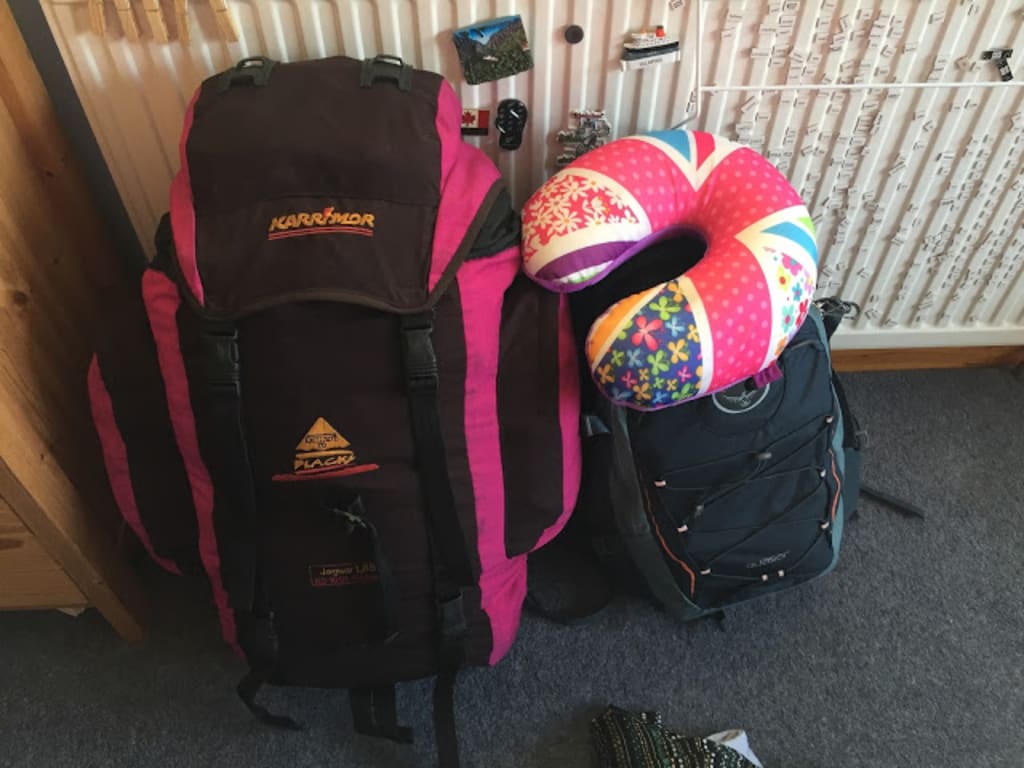Preparing for Travel
Just a bit of personal advice for travellers. This is an edited version of what I wrote before I went to Ghana so I've been able to add in some tips that I picked up while I was away.

On the run up to my trip to Ghana, I starting preparing properly just after the New Year (to leave mid-February) and, to be honest, it would be easier for me to write a post about what NOT to do. So that's what I'm going to start with, here goes:
Don't leave vaccinations till the last minute.
OK, there are some vaccinations where the full course of them is pretty much impossible to complete before you go. For example, I had to get an accelerated course of Hep B which consists of four jabs, three within a month and the fourth a year later. Now, the year before, I didn't even know that I was going to have a year off, let alone go to a country where I needed a Hep B jab, so it's understandable that I didn't have time to complete the course. I'm not completely immune to Hep B but at least it would have been less severe if I had happened to get it.
Vaccinations that you need to leave plenty of time for:
- MMR — two jabs that need to be given a month apart.
- Yellow fever — only one jab but if you need this and MMR, the first MMR jab has to be given at least a month after yellow fever as they are both live vaccines (or visa versa, yellow fever one month after last MMR). I'm aware that most of you reading this will have had MMR as toddlers, but I had to have it again as I was given the three jabs separately when I was little because of the weird link to Autism claim which has now been disproved.
- Hep B — as mentioned above.
- Rabies — three jabs, takes a month to complete (and they're not as painful as people say, I promise)!
- TB (BCG) — cannot be given within a month of MMR or yellow fever, and takes extra time anyway because you have to have a scar test to see if you already have some immunity, and then they will give you the vaccine a week later if you need it.
Most people will have had a BCG jab when they were babies or in school (if you were in secondary school in 2005 or before), but it's a lengthy process to get it done and takes six weeks to activate. However, it is treatable and you will definitely know about it if someone around you has TB (lots of coughing, night sweats, etc). If you go somewhere and hear of a nearby case of TB, speak to a TB nurse when you get home and they can screen you for the infection.
If you're going to a country that requires you to have a yellow fever certificate (such as Ghana), my advice is get this done first, as you will most likely need it when applying for your visa. It is only one jab but still.
All other vaccines like Hep A are pretty quick and easy.
Don't make yourself do loads of shopping trips to get everything you need.
I did this as well and it's been a pain. To be honest, I'm the kind of person who hates spending a lot of time in shopping centres, especially on a Saturday, so I tend to keep my list to a minimum. However, it's so much easier and more satisfying to get everything you need in one swoop, and then you can properly focus on packing and sorting stuff, rather than realising "Oh I still need to get that thin"' and having to go to town again. It's worth spending time making a long detailed list of everything you need. Even make separate lists of clothes, toiletries, and accessories, so that when you're in Boots or Superdrug you can get out the toiletries and medical lists and sort everything, rather than doing a big shop and then later realising there was something down the bottom of the mega-long list that needed to be bought from that shop. Which leads me to my next bit of advice:
Make lists of everything (and I mean everything).
Lists are not only useful when packing to leave, but also when you're coming home so that you don't leave anything behind. I like to type up my lists in Microsoft Word in a table format with two boxes next to each item, one for on the way there, and the other for on the way back (I know, I'm very perfectionist like that). Make sure you save the lists as well, so that if you go on a similar trip in the future, you've already got a list sorted.
Check out what the weather is going to be like in the country you're visiting and only pack clothes to fit the climate.
I'm putting this in because I spent three weeks travelling around Vietnam in July carrying a pair of jeans and a fleece in my rucksack and I never wore them once. I didn't even wear a sweatshirt it was so hot. If you're going to go to a hot country, I would take one light sweatshirt just in case you need to cover up, but otherwise stick to thin long sleeved shirts, t-shirts, shorts and thin trousers. It's always useful to have long light clothes for covering up if the customs of the country require you to do so (Ghana does), especially in churches and religious places. These are also useful for avoiding mosquitoes!
Read up on the customs and etiquette in the country you are visiting.
This is always useful as something perfectly normal in the UK could land you in prison in another country (actually I'm exaggerating, but you know what I mean). For example, I found out that the thumbs up sign is a rude gesture in Ghana, and because I'm going to be working with kids, I could have got myself into some sticky situations if I didn't know this. But also just general things like how to greet people, how to address them, how to speak to them (in Nigeria, it is rude to look someone of higher status in the eye when you talk to them, whereas in the UK, this is the polite thing to do). Some allowance will usually be given to tourists, however you are likely to gain more respect from the locals if they can see that you have made some effort to learn the customs.
Important: If you have to take Malaria tablets, take them at the same time everyday.
I think I read somewhere that taking the tablets in a routine makes them more effective (don't quote me on that), all I know is that I took mine at roughly the same time everyday and I didn't get malaria, and my friend was less regular with taking his and he got the disease. Trust me, malaria is not a disease you want to contract; it can be treated but it's not nice. I took mine after breakfast everyday because you need to have eaten before hand otherwise they make you feel queasy. I also found it's good to make a note every time you take your pills so that you don't have to worry about missing a day (you know when you do something and then five minutes later forget that you've done it? It prevents that from happening). And if you do think you might have malaria, get medical help ASAP!
About the Creator
Hannah Paish
Just a 24-year-old trying to separate stupidity from smart stuff.






Comments
There are no comments for this story
Be the first to respond and start the conversation.